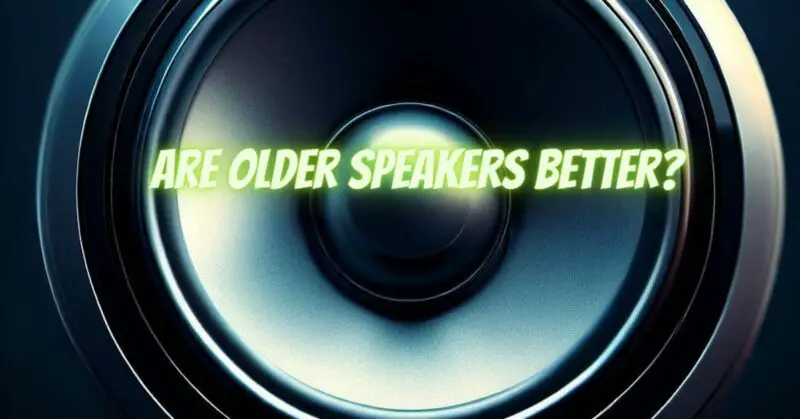The world of audio enthusiasts often finds itself in a never-ending debate: Are older speakers better than their modern counterparts? While nostalgia and the allure of vintage equipment play a significant role in this discussion, several factors influence the perceived quality of older speakers. In this article, we’ll explore the pros and cons of older speakers and examine whether they truly stand the test of time.
The Appeal of Older Speakers
- Vintage Aesthetics: Older speakers often boast classic, aesthetically pleasing designs that appeal to collectors and enthusiasts seeking a touch of nostalgia.
- Build Quality: Many older speakers were built with an emphasis on craftsmanship and durability. They feature sturdy enclosures and high-quality materials that contribute to their longevity.
- Unique Sound Signatures: Some vintage speakers are known for their distinct sound characteristics, which can be highly sought after by audiophiles looking for a specific sonic flavor.
The Limitations of Older Speakers
- Outdated Technology: Older speakers may use outdated driver technology and crossover designs that lack the advancements of modern engineering. This can result in limitations in frequency response and overall performance.
- Deterioration: Over time, speaker components, such as foam surrounds, voice coils, and capacitors, can degrade and affect sound quality. Maintenance or restoration may be necessary.
- Efficiency: Older speakers may not be as efficient as their modern counterparts, requiring more power to achieve similar volume levels. This can strain older amplifiers and lead to increased power consumption.
- Compatibility: Older speakers may not be compatible with modern audio equipment, requiring adapters or modifications to connect to contemporary sources.
Factors to Consider When Assessing Older Speakers
- Condition: The condition of older speakers is crucial. Well-preserved speakers with minimal wear and tear are more likely to provide satisfactory performance.
- Restoration: Restoring older speakers by replacing worn components can significantly improve their sound quality and longevity.
- Listening Environment: The acoustic characteristics of your listening room or space can greatly influence how older speakers perform. Proper placement and acoustic treatment can make a substantial difference.
- Personal Preferences: Your listening preferences play a significant role. Some may appreciate the warm, vintage sound of older speakers, while others may prefer the accuracy and clarity of modern designs.
The debate over whether older speakers are better than modern ones largely depends on individual preferences, intended use, and the condition of the vintage equipment. While vintage speakers offer unique aesthetics and, in some cases, distinct sound signatures, they may also come with limitations stemming from outdated technology and wear and tear.
It’s essential to evaluate older speakers on a case-by-case basis, considering factors such as condition, restoration potential, and compatibility with your audio system. Additionally, modern speakers benefit from advancements in technology and materials, providing excellent sound quality and versatility.
In the end, whether you opt for older or modern speakers, the key is to choose the equipment that aligns with your preferences and listening goals, allowing you to enjoy your music to the fullest.


